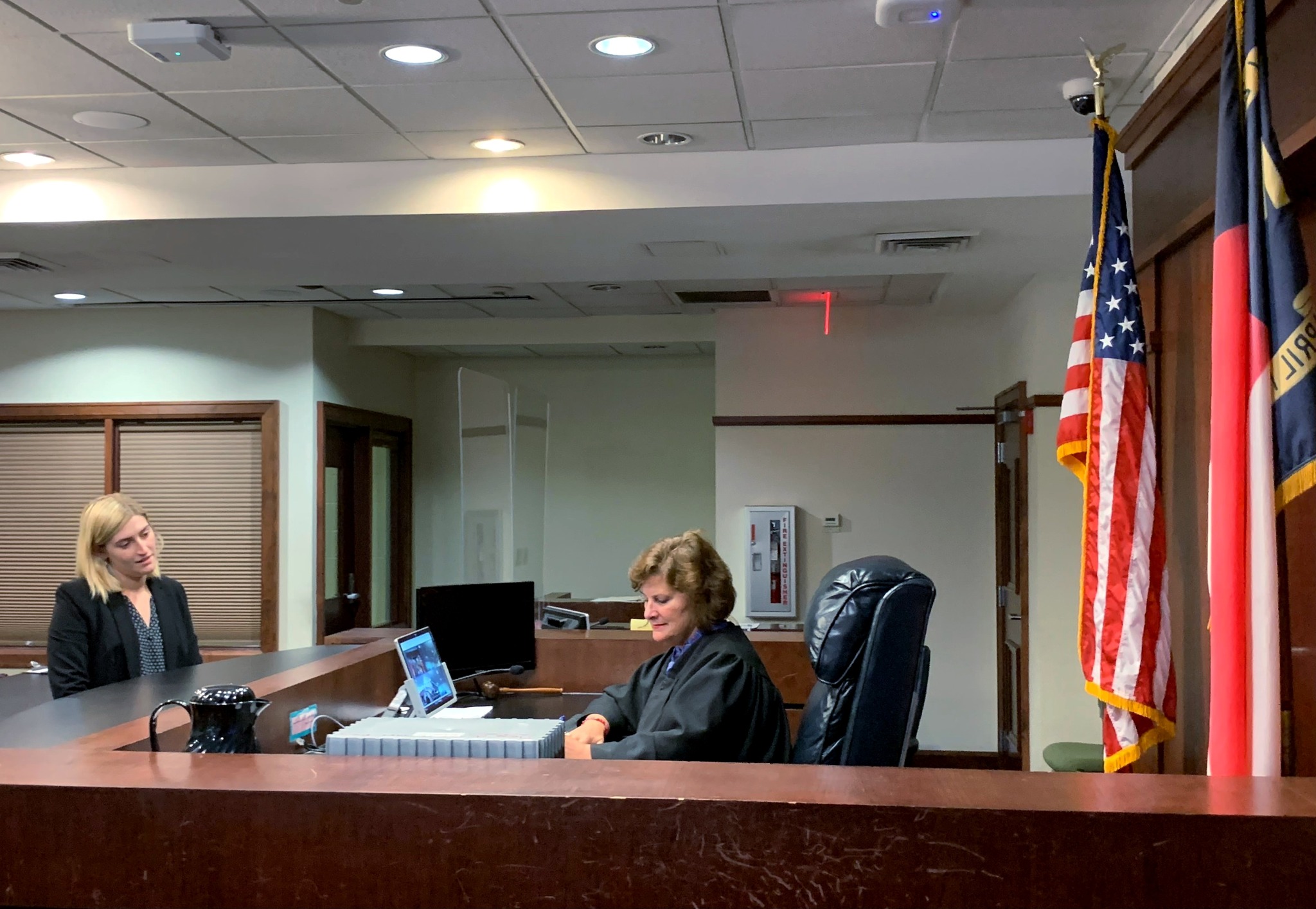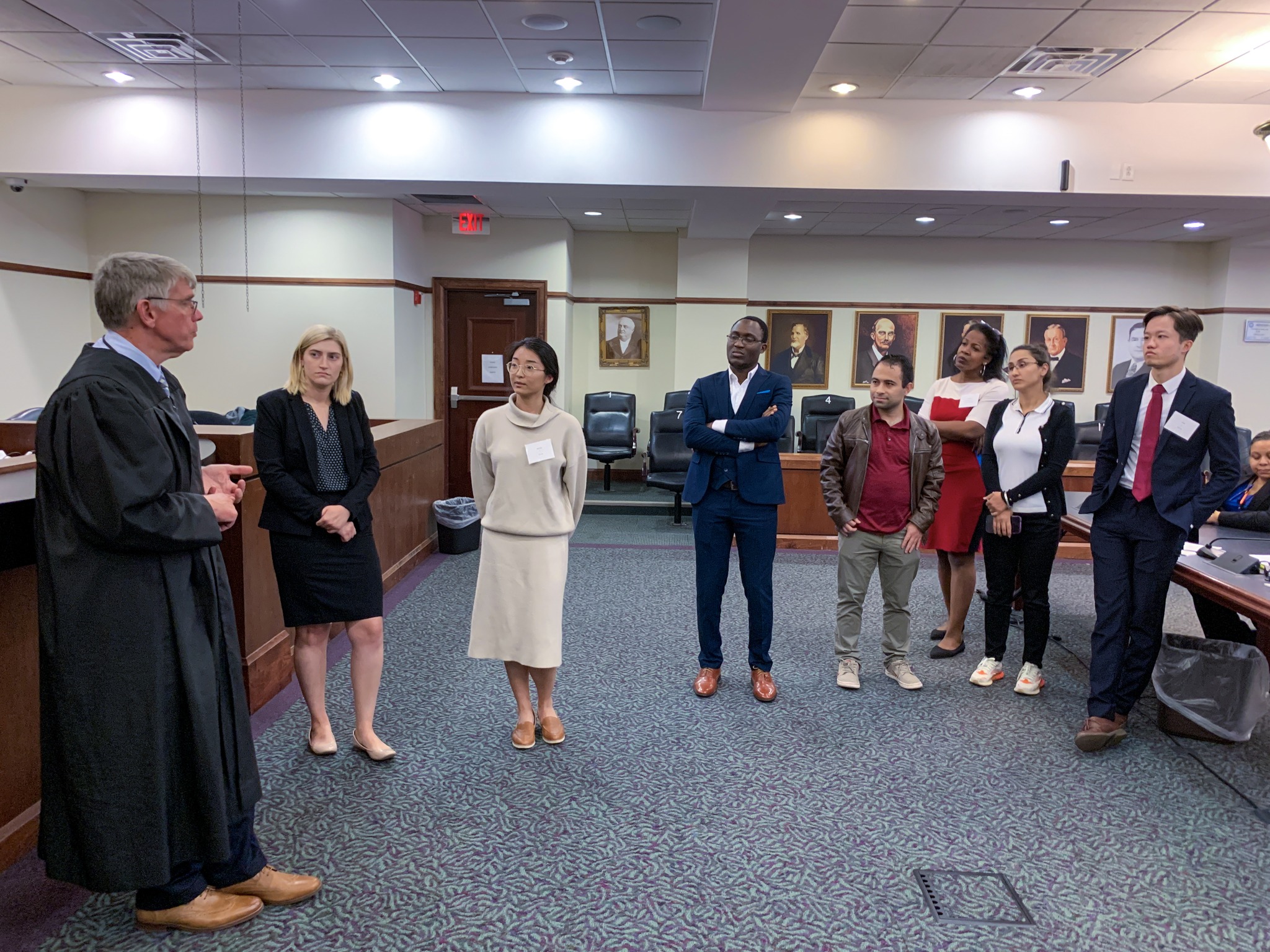Students spend Fall Break helping clients at expunction clinic in Wilmington
Volunteering at a pro bono clinic in Wilmington over fall break provided several Duke Law students with an experiential learning opportunity and a chance to help others.
Seven Duke Law students spent their fall break in New Hanover County helping give nearly 30 people a new start with a clean criminal record.

The student-attorneys traveled to Eastern North Carolina to help launch the county’s new Second Chance Wilmington initiative through a partnership between the Office of Pro Bono Programs and Legal Aid of North Carolina (LANC).
Criminal records can be a significant barrier to securing housing and employment. In North Carolina, they can include even dismissed charges and acquittals, creating a negative impression with employers, landlords, and licensing boards that makes it more difficult for people to access stable housing and economic opportunity.
But during a three-day expunction clinic, the student team – Hannah Bloom ‘24, Elaine Gao ’24, Yuchen Han ’24, Lok Ho JD-LLMLE ’25, and Mujib Jimoh LLM ’23, Nargiz Kazimova LLM ’23, and Courtney Schrater ’24 ¬– helped clients expunge those records of past mistakes.
They analyzed criminal records for expunction eligibility, interviewed clients, drafted documents, and presented completed petitions in court for judicial review – applying the knowledge they’re learning in classes to real-world situations and developing professional skills including building attorney-client trust and communicating complex statutes into understandable concepts.
“I'm very passionate about reforming the criminal legal system and protecting the rights of currently incarcerated people, as well as those who have interacted with the system,” Bloom said. “Given these drastic impacts, I was thrilled to help clients work toward clearing their records.”
D.J. Dore, Duke Law’s Director of Pro Bono, coordinated the student team while Ayana Robinson, supervising attorney of LANC’s Expunction Unit, selected clients and organized supervisory staff, including legal professionals and local officials from LANC, The Harrelson Center, and the New Hanover & Pender County District Attorney’s Office and Public Defender’s Office.
Over three days of working in the clinic and meeting with clients, the students were able to prepare petitions to expunge nearly 150 eligible criminal records, Dore said. They then presented some of their clients’ petitions during expunction hearings in New Hanover County District Court and Superior Court. While Han said it felt deeply rewarding to see his work being acknowledged by the judges, Ho recalled feeling both intimidated and nervous.
“I later learned that in many cases, individuals without representation would have to similarly appear before a judge to complete the expunction process,” Ho said. “To me, this further underscores the importance of pro bono work, as completing an expunction petition requires significant time and resources that many justice-impacted individuals likely need.”
Dore observed that while the legal impact of the project was significant, the cultural lessons learned were just as important.
“I literally watched several of the students transform over the course of clinic,” Dore said. “What seemed like a scary proposition on day one: analyzing complex records and interacting with justice-involved clients, sometimes to deliver difficult advice, morphed into confident and sensitive community lawyering by day three.”
While not most people’s idea of a typical fall break, the students said their time working at the expunction clinic provided them with important lessons on working with the law and with people impacted by it.
"The legal impact of this project was significant, but the cultural lessons learned were just as important to the students. I literally watched several of the students transform over the course of clinic."
“The most valuable skill I learned was how to effectively communicate according to whom I was speaking with,” Ho said. “For instance, I found that presenting my findings to my supervising attorney is different from explaining the expunction process to my client.”
Han added: “We should imagine ourselves in the situations of other people, including clients with criminal records. Abandon complicated professional terms and use straight and easy words to let others understand your point.”
In addition to engaging with members of the local legal community, students also enjoyed a professional lunch with Judge Jones, Judge Robinson, Chief District Judge Julius H. Corpening, New Hanover & Pender County District Attorney Ben David, and Wilmington City Councilman Kevin Spears. The students even got to observe part of a Rule 404(b) hearing in a Superior Court criminal case.
The students also volunteered a few hours at the New Hanover County Teen Court. The Teen Court program offers juveniles with misdemeanor offenses a diversionary option to the formal criminal legal system and has proved effective in several North Carolina communities.
“I love that kids in New Hanover County have access to an alternate form of accountability,” Bloom said. “It was encouraging to know that they could still be held liable while avoiding the harsh consequences of the criminal legal system.”
Dore credited the Wilmington-area partners for providing the Duke Law student-attorneys with a meaningful pro bono experience.
“These types of high-impact pro bono projects, especially in communities outside of the Triangle, are simply not possible without the support of dedicated partners including elected government and court officials, and community activists,” he said.
“I’m constantly impressed by the motivated, passionate students Duke Law can bring to bear, but it’s our local partners that tell us where to focus our students’ efforts and energy for maximum effect.”
Click here to learn more about the Pro Bono Program at Duke Law School.











